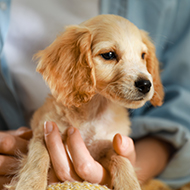
The funding will enable the team to follow up with the original puppy recruits as they reach adulthood.
Vets investigating the early lives of so-called ‘pandemic puppies’ have been awarded funding from Battersea Dogs and Cats Home to further study the UK-wide phenomenon.
In November 2020, Dr’s Rowena Packer, Dan O’Neill and Claire Brand of the RVC launched an Animal Welfare Foundation-funded study to investigate the surge in puppy buying at the start of the coronavirus pandemic.
The study of some 6,500 new puppy owners, published in the journal Animals, revealed how puppy buying changed during the pandemic and showed how such changes posed threats to the future welfare of young dogs.
Data gathered on the early-life experiences of these puppies also suggested that the socialisation experiences of many of these puppies lacked owing to the pandemic’s restrictions and may negatively impact their behaviour.
This further funding from Battersea will enable the team to follow up the original puppy recruits as they reach adulthood via a series of surveys exploring their behaviour, health and welfare. The team will also explore elements of the bond between dog and owner and the impact of COVID-19 on lifestyles to better understand the potential relinquishment risks for this population.
Dr Rowena Packer, a lecturer in companion animal behaviour and welfare science at the RVC, said: "Pandemic Puppies have experienced a unique upbringing during an unprecedented time in our lives. Unfortunately, growing up during the pandemic means that many puppies bought in this period were exposed to a limited range of socialisation and habituation experiences during their critical developmental period, which may predispose them to future behavioural problems.
"In addition, we are concerned that some of the puppy buying practices that increased during the pandemic, such as buying puppies without seeing them with their mother, and not seeing the environment a puppy was reared in, could mean that many owners were duped into buying from poor-welfare breeders. This may further predispose these young dogs to health and behavioural problems in the future.
"With this new funding from Battersea, we will follow our cohort of Pandemic Puppies over the next year, to better understand any current or potential problems developing in this population, explore their relationship with their owners and identify threats to this important bond, and highlight ways the veterinary profession and wider animal welfare community can best support these dogs and their owners as they navigate early adulthood. We are extremely grateful to Battersea for funding this timely study which we hope will help this vulnerable population."



 The RCVS has announced a new version of its 1CPD mobile app, with enhanced features for veterinary surgeons and veterinary nurses to record their continuing professional development.
The RCVS has announced a new version of its 1CPD mobile app, with enhanced features for veterinary surgeons and veterinary nurses to record their continuing professional development.